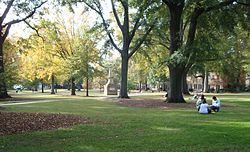Related Research Articles
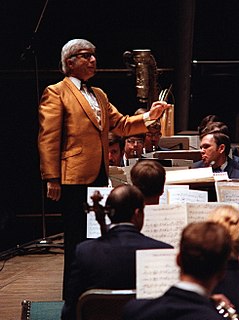
Elmer Bernstein was an American composer and conductor known for his film scores. In a career that spanned more than five decades, he composed "some of the most recognizable and memorable themes in Hollywood history", including over 150 original movie scores, as well as scores for nearly 80 television productions. Examples of his widely popular and critically acclaimed works are scores to The Ten Commandments (1956), The Magnificent Seven (1960), To Kill a Mockingbird (1962), The Great Escape (1963), The Rookies (1972–76), Animal House (1978), Airplane! (1980), Heavy Metal (1981), Ghostbusters (1984), The Black Cauldron (1985), Cape Fear (1991), The Age of Innocence (1993), Wild Wild West (1999) and Far from Heaven (2002). Early in his career, he also scored the infamous camp classic Robot Monster.

Williams–Brice Stadium is the home football stadium for the South Carolina Gamecocks, the college football team representing the University of South Carolina in Columbia, South Carolina. It is currently the 16th largest on-campus college football stadium in the NCAA and is located on the corner of George Rogers Boulevard and Bluff Road adjacent to the South Carolina State Fairgrounds.
Carolyn Leigh was an American lyricist for Broadway, film, and popular songs. She is best known as the writer with partner Cy Coleman of the pop standards "Witchcraft" and "The Best Is Yet to Come". With Johnny Richards she wrote the million-seller "Young at Heart" for the film of the same name, starring Frank Sinatra.

The University of South Carolina is a public research university in Columbia, South Carolina. It has seven satellite campuses throughout the state and its main campus covers over 359 acres (145 ha) in downtown Columbia not far from the South Carolina State House. The university is classified among "R1: Doctoral Universities with Highest Research Activity". It also houses the largest collection of Robert Burns and Scottish literature materials outside Scotland, and the world's largest Ernest Hemingway collection.
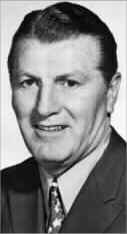
Frank Joseph McGuire was an American basketball coach. At the collegiate level, he was head coach for three major programs: St. John's, North Carolina, and South Carolina, winning over a hundred games at each.

How Now, Dow Jones is a musical comedy by Academy Award winner Elmer Bernstein, Tony Award nominee Carolyn Leigh and Max Shulman. The original Broadway production opened in December 1967. A critically acclaimed revised version premiered Off-Broadway in August 2009.

Paul Franklin Dietzel was an American football player, coach, and college athletics administrator. He served as the head coach at Louisiana State University (1955–1961), the United States Military Academy (1962–1965), and the University of South Carolina (1966–1974), compiling a career record of 109–95–5. Dietzel's 1958 LSU team concluded an 11–0 season with a win over Clemson in the Sugar Bowl and was a consensus national champion. For his efforts that year, Dietzel was named the National Coach of the Year by both the American Football Coaches Association and the Football Writers Association of America. Dietzel also served as the athletic director at South Carolina (1966–1974), Indiana University Bloomington (1977–1978), LSU (1978–1982), and Samford University (1985–1987).

The 2007 South Carolina Gamecocks football team represented the University of South Carolina in the Southeastern Conference during the college football season of 2007–2008. The Gamecocks were led by Steve Spurrier in his third season as USC head coach and played their home games in Williams-Brice Stadium in Columbia, South Carolina. The team was bowl eligible at 6–6 but was not selected for a bowl game.
Step to the Rear may refer to:
The Clemson–South Carolina rivalry,is an American collegiate athletic rivalry between the University of South Carolina Gamecocks and the Clemson University Tigers. Since 2015, the two also compete in the Palmetto Series, which is an athletic, head-to-head competition between both schools, not just in football, but also more than a dozen competitions throughout each school year. Both institutions are public universities supported by the state of South Carolina, and their campuses are separated by only 132 miles. South Carolina and Clemson have been bitter rivals since 1896, and a heated rivalry continues to this day for a variety of reasons, including the historic tensions regarding their respective charters and the passions surrounding their athletic programs.

The South Carolina Gamecocks football program represents the University of South Carolina in the sport of American football. The Gamecocks compete in the Football Bowl Subdivision of the National Collegiate Athletic Association (NCAA) and the Eastern Division of the Southeastern Conference. Will Muschamp currently serves as the team's head coach. They play their home games at Williams-Brice Stadium.
"We Hail Thee Carolina" is the alma mater of the University of South Carolina. It was adopted by the University in 1912 and is sung by alumni and students at Gamecock athletic events. The alma mater is also used to conclude each football game, home or away.

The Carolina Band, or the USC Marching Band, has performed at the University of South Carolina since 1920. This 400-member marching band performs at all South Carolina Gamecocks football games played at Williams-Brice Stadium and most football games outside of Columbia, South Carolina—including bowl games.

The historic 1969 South Carolina Gamecocks football team represented the University of South Carolina during the 1969 NCAA University Division football season. Led by fourth-year head coach Paul Dietzel, the Gamecocks won the Atlantic Coast Conference (ACC) championship, which remains their only conference championship in history. They were defeated by West Virginia in the Peach Bowl and finished with a record of 7-4. They played their home games at Carolina Stadium.
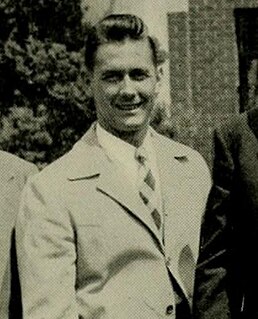
Warren Giese was a state legislator in South Carolina and a college football coach. He served as the head football coach for the South Carolina Gamecocks for five years at the University of South Carolina. He later served in the South Carolina State Senate.

The Georgia–South Carolina football rivalry is an American college football rivalry between the Georgia Bulldogs and South Carolina Gamecocks. The rivalry started in 1894, and has been played annually since the Gamecocks joined the Southeastern Conference (SEC) in 1992. Georgia leads the series 51–19–2.
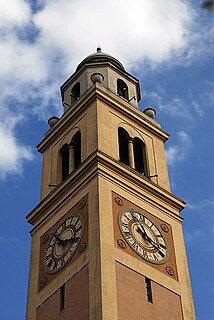
Louisiana State University is the flagship university of the state of Louisiana, United States. This article describes the traditions of the university.

The NC State–South Carolina football rivalry is an American college football rivalry between the NC State Wolfpack and South Carolina Gamecocks. South Carolina leads the series 28–26–4.

South Carolina Gamecocks football under Steve Spurrier covers the history of the South Carolina Gamecocks football program under Steve Spurrier from 2005 to 2015.
References
- ↑ The Carolina Bands Collection: Series I: Sheet Music (1914–2000s): 1/12 "Step to the Rear." The Music Library at the University of South Carolina website. Retrieved 1 December 2009.
